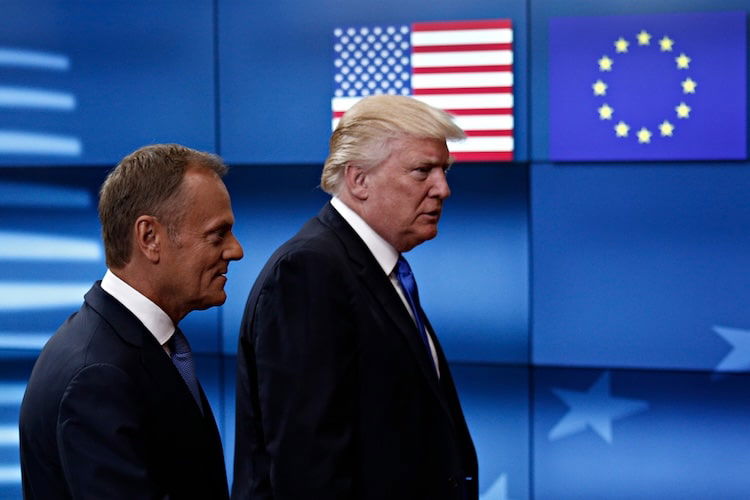Despite presenting itself as a bulwark of the global liberal order, the incoming new EU administration appears politically and culturally more aligned with the Trump White House than with the pro-European mainstream political forces supporting the incoming EU Commission. This makes the EU more vulnerable that it should be at unprecedented geopolitical times.

European Union leaders were once again caught off guard by Donald Trump’s victory. Despite the damage done by a president who disregarded his allies during his first term, today’s EU remains ill-prepared to withstand Trump’s renewed influence. Why is this the case?
Firstly, European security remains heavily dependent on the United States’ support through NATO. Secondly, European foreign policy is still closely aligned with the United States, whether on issues like Israel or China. Thirdly, Europe has not diversified its economic partnerships sufficiently, continuing to rely heavily on trade relations with the US—in the absence of a formal trade agreement—while seeking to reduce its energy dependence on Russia. Finally, Germany and France are weakened by internal political crises, creating a power vacuum that could be filled by pro-European forces like Poland’s Donald Tusk or by Trump-aligned far-right groups who see his return as an opportunity to reshape the EU from within.
Given these circumstances, it is unsurprising that many EU leaders rushed to congratulate the new President, often with unprecedented flattery. The EU remains vulnerable to trade wars from the US, China, and other emerging economies, as well as to a new multipolar security order. Meanwhile, the Union has lost—rather than gained—influence on the world stage, including in Ukraine and the Middle East.
Compared to 2016, the EU is now less capable of coping with or engaging the Trump administration. Today’s EU is not only geopolitically weaker but also more politically divided. Although Trump’s policies directly threaten European prosperity, security, and sustainability, European political forces may struggle to find a unified strategy this time around.
The current European Parliament is the most right-wing in EU history. Over half of its members belong to the traditionally conservative European People’s Party (EPP), of which Commission President Ursula von der Leyen is a member, or to far-right groups like the European Conservatives and Reformists (ECR). The ECR unites Italian Prime Minister Giorgia Meloni’s party with other far-right factions, such as Éric Zemmour’s Reconquête in France, Spain’s Vox, and the Sweden Democrats. Additionally, the Patriots for Europe (PoE), co-led by Marine Le Pen and Viktor Orbán, and the Europe of Sovereign Nations group, dominated by Germany’s Alternative für Deutschland, contribute to the strong right-wing presence. A similar picture emerges in other EU institutions, such as the European Commission and the European Council, where over half of the members come from governments comprising similarly right-wing forces.
From this perspective, the EU may be unprepared and unwilling to deal with threats from across the Atlantic in a united fashion. In other words, there might be more transatlantic political convergence than initially apparent.
Several examples illustrate this point. First, the Trump administration’s push to roll back environmental and climate standards—symbolized by its withdrawal from the Paris Agreement—aligns with the deregulatory tendencies within von der Leyen’s Commission. Second, Trump’s plan to mass deport undocumented immigrants from the United States reflects a broader trend within the EU, which has increasingly moved away from upholding international law, as seen in the establishment of “return centers.” Third, Trump’s promise to end the war in Ukraine within 24 hours could find support not only among pro-Kremlin far-right groups like the Patriots of Europe and Europe of Sovereign Nations, but also among conservative elements within the EPP, as well as segments of the liberals and the left.
This suggests that the “new Europe” that emerged after the June European Parliament elections might be politically and culturally more aligned with the Trump administration than with pro-European mainstream forces. This unexpected and unlikely “meeting of the minds” across the Atlantic could undermine the EU’s ability to present a united front against an unreliable partner.
Moreover, while questions abound regarding whether the Trump administration will focus on political reforms or attempt to change the rules of democracy in America, the EU could witness an equally concerning development: Viktor Orbán’s blueprint for an authoritarian regime taking root. This could involve dismantling democratic institutions, gaining control over the judiciary and media, and serving the interests of those loyal to the President.
This scenario has been foreshadowed by multiple meetings between Viktor Orbán, the current holder of the EU Council presidency, and then-former President Trump. Yet, this transatlantic bond has largely gone unnoticed.
Following the recent summit of the nascent European Political Community (EPC) in Budapest, former French Commissioner Thierry Breton publicly acknowledged Orbán’s privileged relationship with Trump as an opportunity for the EU to advance its interests—despite these interests varying significantly across member states. Meanwhile, French President Macron’s call for the EPC to reduce dependence on the US may not align with the current political reality. Hence, efforts to pivot away from the EU towards an exclusively intergovernmental, geopolitical entity like the EPC seem increasingly problematic.
From this perspective, the current political juncture could act as a catalyst for significant changes to the European integration project, potentially steering it in the wrong direction. As the transatlantic bond weakens, some EU leaders—such as Italy’s conservative Giorgia Meloni or Spain’s socialist Pedro Sánchez—may be emboldened to pursue their national interests through bilateral rather than EU-based dialogues with the US. The EU’s mission and sense of direction have never been more fundamentally challenged by the very governments that make up the Union.
The silver lining in this otherwise challenging situation is that EU leaders are being pushed to clarify their common goals—both within the EU and the EPC. This moment of reckoning is likely to be accelerated by the moves of the incoming US administration, which is not hesitating to assert itself even before the January inauguration of the 47th President of the United States.
Alberto Alemanno is Jean Monnet professor of European Union law at HEC Paris, visiting professor at the College of Europe, Bruges and Europe’s Futures fellow at IWM in Vienna. He is the founder of the non-profit organisation and movement The Good Lobby committed to equalise access to power.
